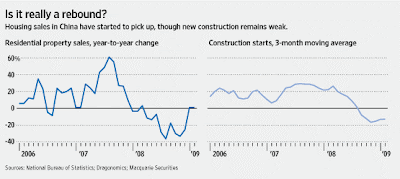Some cautious optimism in China’s housing market.
BEIJING — There are tentative signs of improvement in a key sector of China’s economy, as lower prices start to lure buyers back into the battered housing market.
The nascent uptick in home sales hasn’t yet translated to a restarting of construction, a driver of jobs and economic activity, because the supply of empty homes that built up during the boom remains large. Still, the fact that Chinese households are responding to falling mortgage costs and lower real-estate prices is a positive sign for consumer spending in the world’s third-biggest economy.
The volume of residential property sold nationwide in January and February inched up 1.1% from a year earlier, government figures show. That compared with a 20.3% decline for all of 2008. Property consultancy Soufun says the numbers for housing transactions in major cities have been rising in the past few weeks.
“The Chinese housing market may have a good chance to be among the first ones to see real signs of picking up,” said Mei Jianping, a professor of finance at the Cheung Kong Graduate School of Business in Beijing.
President Hu Jintao, speaking just before flying to London for Thursday’s Group of 20 summit, said early effects of his government’s stimulus policies already are evident, giving him confidence China’s growth will stabilize.
China’s housing boom wasn’t as heavily fueled by easy credit as those in the U.S. or Spain were, analysts say, and there is still real demand for homes from its urbanizing population. In February, average housing prices in China were down 1.2% from a year earlier. U.S. declines have been far sharper.
Huang Yang, a 26-year-old in Beijing who works for a financial magazine, bought a modest apartment in December. “I had thought about buying an apartment for a long time,” she said. The price had dropped nearly 15% from the peak; that helped convince her.
Many analysts forecast a further decline of 10% to 15% in Chinese property prices this year, because of the huge existing supply.
How many more Chinese follow Ms. Huang into the housing market this year will be crucial to determining whether China can meet its leaders’ goal of 8% economic growth, or end up closer to the 5% that some private-sector analysts expect. The stimulus plan, while large, can’t restore growth without a return of private-sector investment.
The first broad indicator published for March suggests the economy hasn’t yet managed to reverse its downturn in growth. Data for the first two months, however, show some encouraging increases in bank lending and investment. Manufacturing activity in China declined in March for the eighth consecutive month as prices and new orders continued to weaken, according to the CLSA China Purchasing Managers Index. The index fell to 44.8 in March from 45.1 in February, CLSA Asia-Pacific Markets said.
Housing will help determine the path that commodity prices take because China’s construction sector accounts for a big part of global demand for raw materials such as steel and copper.
Housing sales are still well below their levels in the boom years, and Chinese consumers aren’t likely to splurge this year.
More important, analysts say the large supply of unoccupied housing needs to be sold off before developers start to build again.
Nationwide, construction starts declined 14.8% in the first two months of 2009 from a year earlier, and purchases of land for development also are still falling. While some economists predict a turnaround by the second half of the year, businesses are still adjusting to what they expect to be a much weaker market. British home-improvement retailer Kingfisher PLC said last week it plans to cut the number of its B&Q stores in China to 41 from 63 this year.
According to Dragonomics, a Beijing-based research firm, 90 million square meters of new, vacant residential property were built in 2008, equivalent to about 820,000 units. Citigroup analysts estimate that real-estate markets in most major Chinese cities will take more than a year to digest the current backlog, and some 20 months in some.
“The market cannot clear in just one or two quarters,” the State Information Center, a government think tank, said in a recent report. “This means that the current industrial adjustment will extend for some time into the future.”
Still, the perception that prices are bottoming is causing home buyers like Xia Feng, a 33-year-old bank employee in Shanghai, to think the worst may be past. He had been eying one place for nearly a year, but held off because prices were too high. When Mr. Xia found out that the price of the unit, near his daughter’s school, had dropped 20%, he signed the deal.
“Last year, there was no doubt that prices would go down,” Mr. Xia said, but further declines now seem less of a sure bet.


